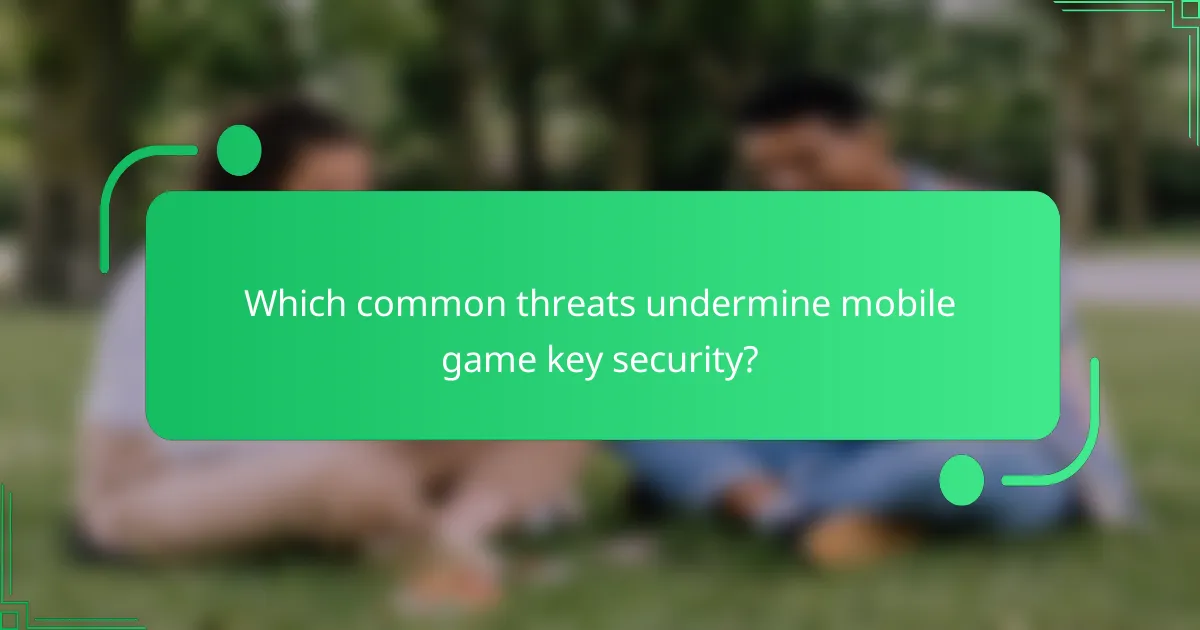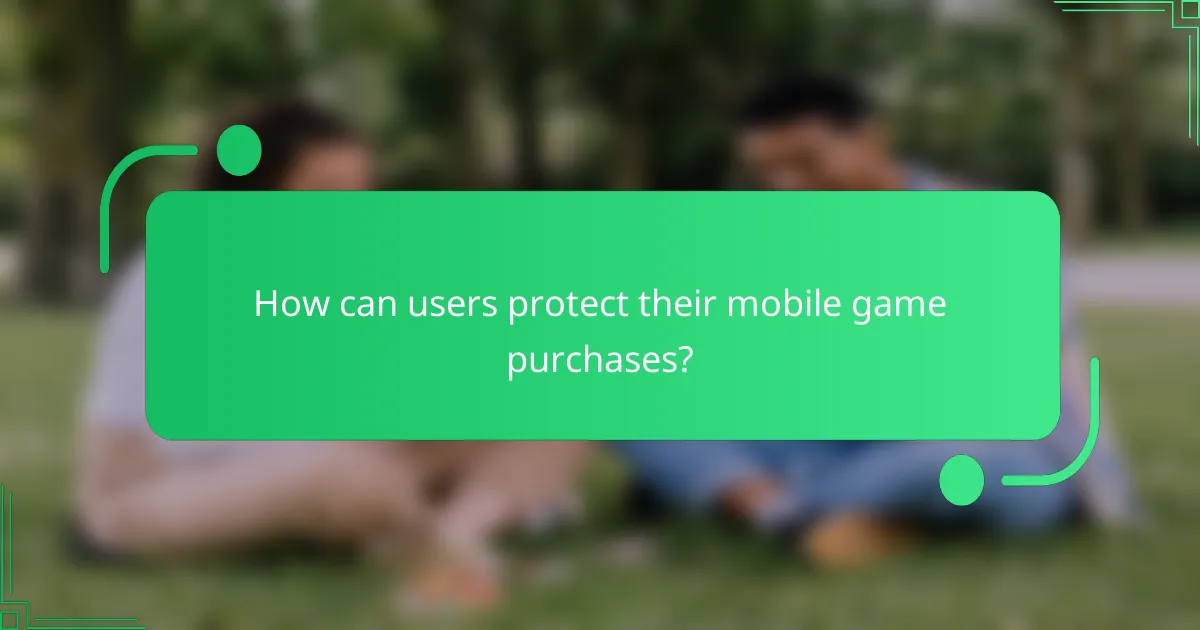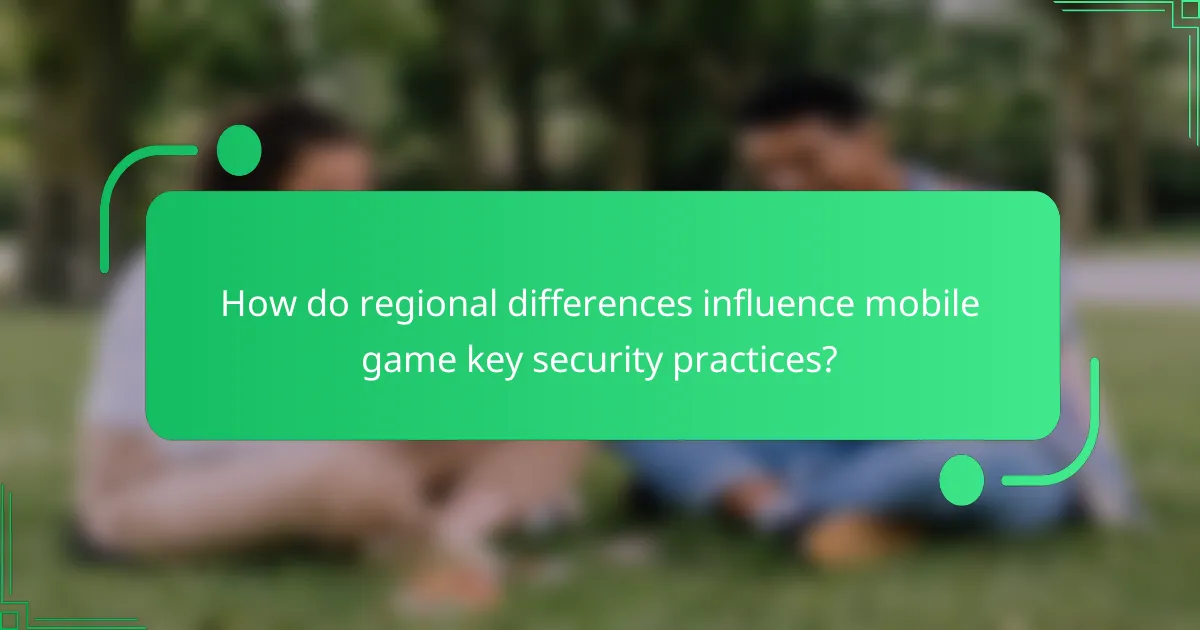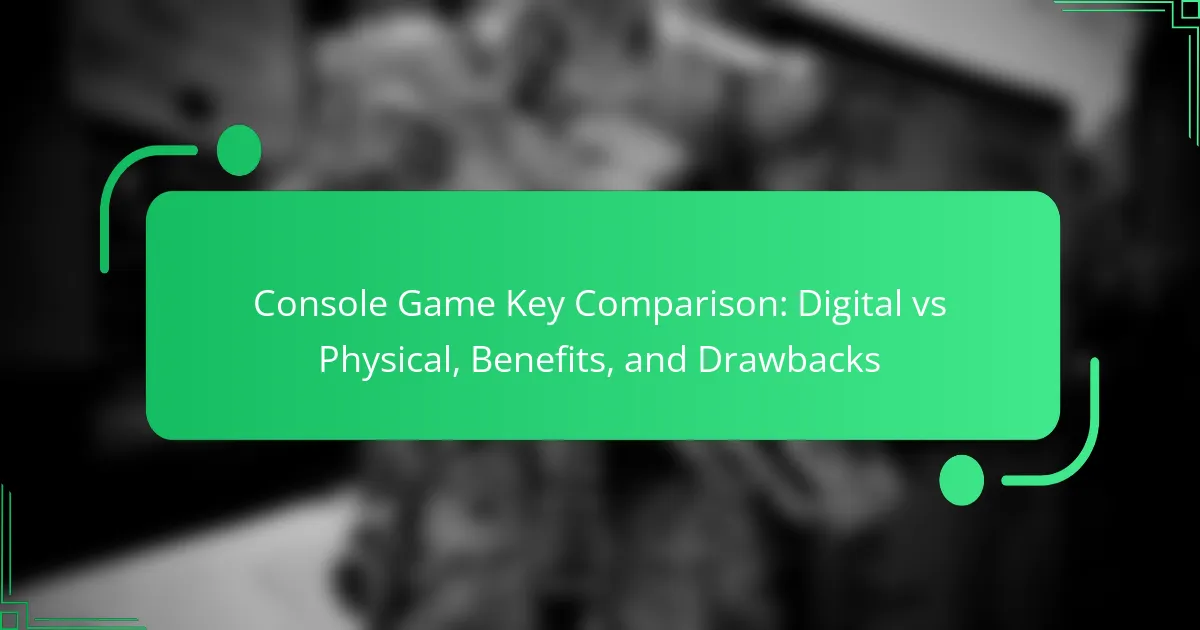Mobile game key security is essential for protecting your purchases and personal information from unauthorized access. Key components include encryption, two-factor authentication, and secure payment methods. Common threats like phishing and malware can compromise your data. Popular platforms implement advanced features to enhance user trust and safety, while future trends focus on biometric authentication and blockchain technology for improved protection.

What are the key components of mobile game key security?
Key components of mobile game key security include encryption, two-factor authentication, secure payment methods, and regular security updates. These elements work together to protect user purchases and personal information from unauthorized access and fraud. Encryption safeguards data during transmission, while two-factor authentication adds an extra layer of verification. Secure payment methods reduce the risk of financial information theft, and regular updates patch vulnerabilities, ensuring ongoing protection.
How do mobile game keys function in the gaming ecosystem?
Mobile game keys enhance security by linking purchases to user accounts and devices. They prevent unauthorized access and ensure users’ personal information remains safe. Each key is uniquely generated, providing a rare attribute that protects against fraud. By requiring authentication, mobile game keys safeguard transactions and maintain trust in the gaming ecosystem.
Why is mobile game key security essential for users?
Mobile game key security is essential for users as it safeguards their purchases and personal information from unauthorized access. Protecting sensitive data prevents financial loss and identity theft. Mobile games often require in-app purchases, making them attractive targets for cybercriminals. Implementing robust security measures, such as encryption and two-factor authentication, enhances user trust and ensures a safer gaming experience. Additionally, awareness of security practices empowers users to protect their accounts effectively.

Which common threats undermine mobile game key security?
Common threats to mobile game key security include phishing attacks, malware, and account hacking. Phishing can trick users into revealing sensitive information. Malware can compromise device security and steal keys. Account hacking often exploits weak passwords or security questions, leading to unauthorized access. Protecting personal information requires vigilance against these threats.
How do phishing attacks target mobile gamers?
Phishing attacks target mobile gamers by exploiting their personal information and payment details. Cybercriminals use fake websites, emails, and in-game messages to trick users into revealing sensitive data. These attacks often mimic legitimate game publishers, creating a false sense of security. Gamers are advised to verify sources and use secure payment methods to protect their purchases.
What role does malware play in compromising game keys?
Malware can compromise game keys by stealing sensitive information or manipulating game files. It often operates through phishing attacks or malicious software that infiltrates devices. Once installed, malware can capture login credentials or intercept transactions, leading to unauthorized access. Protecting your mobile game keys requires robust security measures, including antivirus software and safe browsing practices.

How can users protect their mobile game purchases?
To protect mobile game purchases, users should implement multiple security measures. Use strong passwords and enable two-factor authentication to safeguard accounts. Regularly update the game and device software to patch vulnerabilities. Monitor purchase history for unauthorized transactions and utilize secure payment methods. Avoid public Wi-Fi for transactions to reduce the risk of interception.
What are the best practices for securing game accounts?
To secure game accounts, use strong, unique passwords and enable two-factor authentication. Regularly update your login credentials and avoid sharing account details. Be cautious of phishing attempts and only download games from trusted sources. Monitor your account activity for unauthorized transactions.
Which authentication methods enhance mobile game key security?
Two-factor authentication and biometric verification significantly enhance mobile game key security. These methods add layers of protection, ensuring that only authorized users access purchases and personal information. Two-factor authentication requires a second verification step, such as a code sent to the user’s device. Biometric verification uses unique physical traits, like fingerprints or facial recognition, making unauthorized access more difficult. Implementing these methods can reduce the risk of account theft and enhance overall security for mobile gaming transactions.

What unique security features do popular gaming platforms offer?
Popular gaming platforms offer unique security features like two-factor authentication, end-to-end encryption, and secure payment methods. These measures protect users’ purchases and personal information from unauthorized access. For example, platforms like Steam and PlayStation Network utilize advanced encryption to safeguard transactions. Additionally, some platforms provide account recovery options that enhance security. Overall, these features contribute significantly to user trust and safety in mobile gaming.
How does Steam safeguard mobile game keys?
Steam safeguards mobile game keys through robust encryption, two-factor authentication, and monitoring for suspicious activities. These measures protect user purchases and personal information effectively. Encryption ensures that keys remain confidential, while two-factor authentication adds an extra layer of security. Additionally, Steam’s monitoring systems detect and respond to any unauthorized access attempts, further enhancing security. These combined strategies create a secure environment for users, minimizing the risk of key theft and fraud.
What security measures does the PlayStation Network implement?
The PlayStation Network implements multiple security measures to protect user purchases and personal information. These include end-to-end encryption, two-factor authentication, and regular security updates. Additionally, the network employs fraud detection systems to monitor transactions for suspicious activity. These measures collectively enhance user trust and safeguard sensitive data.

What are the implications of data breaches in mobile gaming?
Data breaches in mobile gaming can lead to significant risks for users, including identity theft and financial loss. These breaches expose personal information, making players vulnerable to fraud. Additionally, compromised accounts can result in unauthorized purchases, impacting both players and developers. As mobile gaming grows, enhancing security measures becomes critical to protect sensitive data and maintain user trust.
How can a data breach affect user trust and game sales?
A data breach can severely undermine user trust and negatively impact game sales. When personal information is compromised, players may feel insecure about their purchases and data safety. Trust diminishes, leading to decreased engagement and potential loss of revenue. Additionally, negative publicity surrounding a breach can deter new users from trying the game, further affecting sales. Maintaining robust mobile game key security is essential to protect user information and sustain consumer confidence.
What steps should companies take post-breach to regain user confidence?
To regain user confidence post-breach, companies must take immediate and transparent action. First, communicate the breach details clearly to users, explaining what data was affected. Next, enhance security measures to prevent future incidents, including implementing two-factor authentication. Additionally, offer identity theft protection services to affected users as a goodwill gesture. Finally, maintain ongoing communication about security improvements and updates to rebuild trust.

How do regional differences influence mobile game key security practices?
Regional differences significantly affect mobile game key security practices by dictating regulations and user behavior. Countries with strict data protection laws, like GDPR in Europe, enforce rigorous security measures. In contrast, regions with lax regulations may adopt less stringent practices, increasing vulnerability to data breaches.
Cultural attitudes towards privacy also shape security approaches. For example, users in Asia may prioritize convenience over security, leading to weaker key management. Conversely, users in North America often demand robust security features, influencing developers to implement advanced encryption methods.
Economic factors play a role as well. In wealthier regions, users are more likely to invest in premium security solutions, while budget constraints in developing areas may limit the adoption of sophisticated security technologies. This disparity creates a varied landscape of mobile game key security practices across different regions.
What are the specific challenges faced by gamers in different regions?
Gamers in different regions face various challenges related to mobile game key security. These challenges include varying levels of cybersecurity awareness, differing regulations on data protection, and the prevalence of fraud.
In regions with low cybersecurity awareness, gamers are more susceptible to phishing attacks and data breaches. For instance, in some developing countries, the lack of education on secure payment methods increases the risk of unauthorized purchases.
Regulations also play a significant role. In regions with stringent data protection laws, such as the EU, gamers may find enhanced security measures that protect their personal information. Conversely, in areas with minimal regulations, gamers may encounter inadequate security protocols.
Fraud is a common challenge globally, but its impact varies. In regions where mobile gaming is rapidly growing, such as Southeast Asia, the rise in fraudulent activities can undermine trust in game developers and payment systems.
Overall, the landscape of mobile game key security is influenced by regional differences in awareness, regulations, and fraud prevalence.
How does legislation impact mobile game key security across countries?
Legislation significantly impacts mobile game key security by establishing regulations that protect consumer data and ensure fair practices. Countries vary in their legal frameworks, influencing how developers secure keys and user information. For instance, the General Data Protection Regulation (GDPR) in Europe mandates stringent data protection measures, affecting key management practices. In contrast, some regions may lack comprehensive regulations, leading to weaker security protocols. Compliance with these laws is essential for developers to build trust and safeguard user purchases.

What future trends are shaping mobile game key security?
Future trends in mobile game key security focus on enhanced encryption, biometric authentication, and blockchain technology. These advancements aim to protect user purchases and personal data effectively.
Encryption techniques are evolving, with stronger algorithms being implemented to safeguard sensitive information. Biometric authentication, such as fingerprint and facial recognition, is becoming standard for securing access to accounts. Blockchain technology offers decentralized security measures, reducing the risk of data breaches and fraud.
As a result, these trends are shaping a more secure environment for mobile gamers, ensuring that their purchases and personal information remain protected.
How is blockchain technology being utilized for enhanced security?
Blockchain technology enhances mobile game key security by ensuring transaction integrity and user anonymity. It employs decentralized ledgers to protect purchases and personal information from unauthorized access. Smart contracts automate verification, reducing fraud risks. Immutable records prevent data tampering, fostering trust among users.
What innovations in encryption are on the horizon for mobile gaming?
Innovations in encryption for mobile gaming focus on enhancing security for purchases and personal data. Emerging technologies include quantum encryption, which offers unprecedented security levels, and blockchain integration, ensuring transaction transparency and integrity. Additionally, biometric authentication is becoming more prevalent, providing a unique layer of security by utilizing users’ physical traits. These advancements aim to protect players from data breaches and fraud while enhancing overall trust in mobile gaming platforms.
What practical strategies can users adopt to optimize their game security?
To optimize game security, users should adopt strategies like enabling two-factor authentication, using strong passwords, and regularly updating their devices. These measures help protect purchases and personal information effectively. Additionally, users should be cautious of suspicious links and only download games from trusted sources. Regularly reviewing account activity can also help identify unauthorized transactions quickly.



